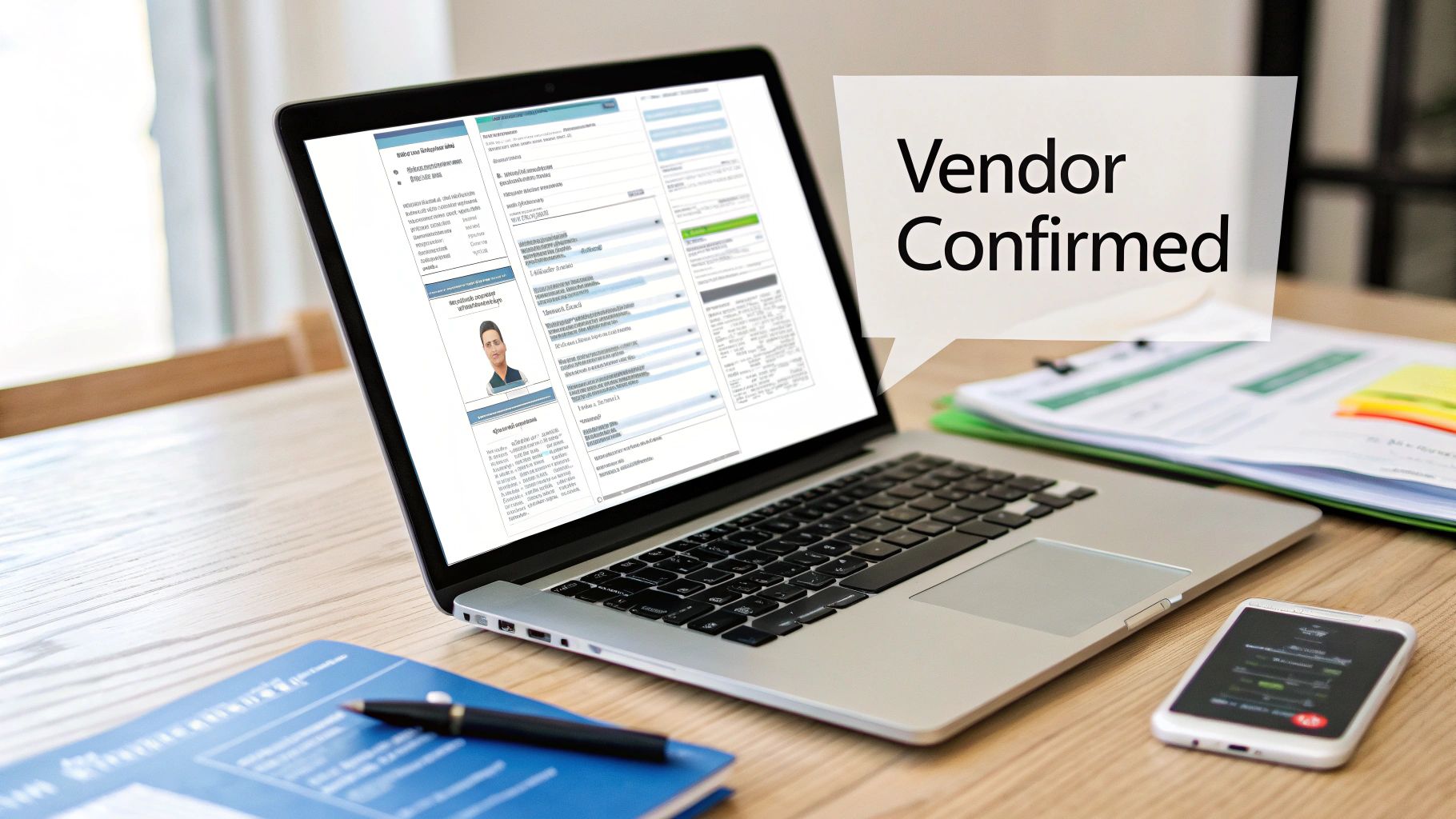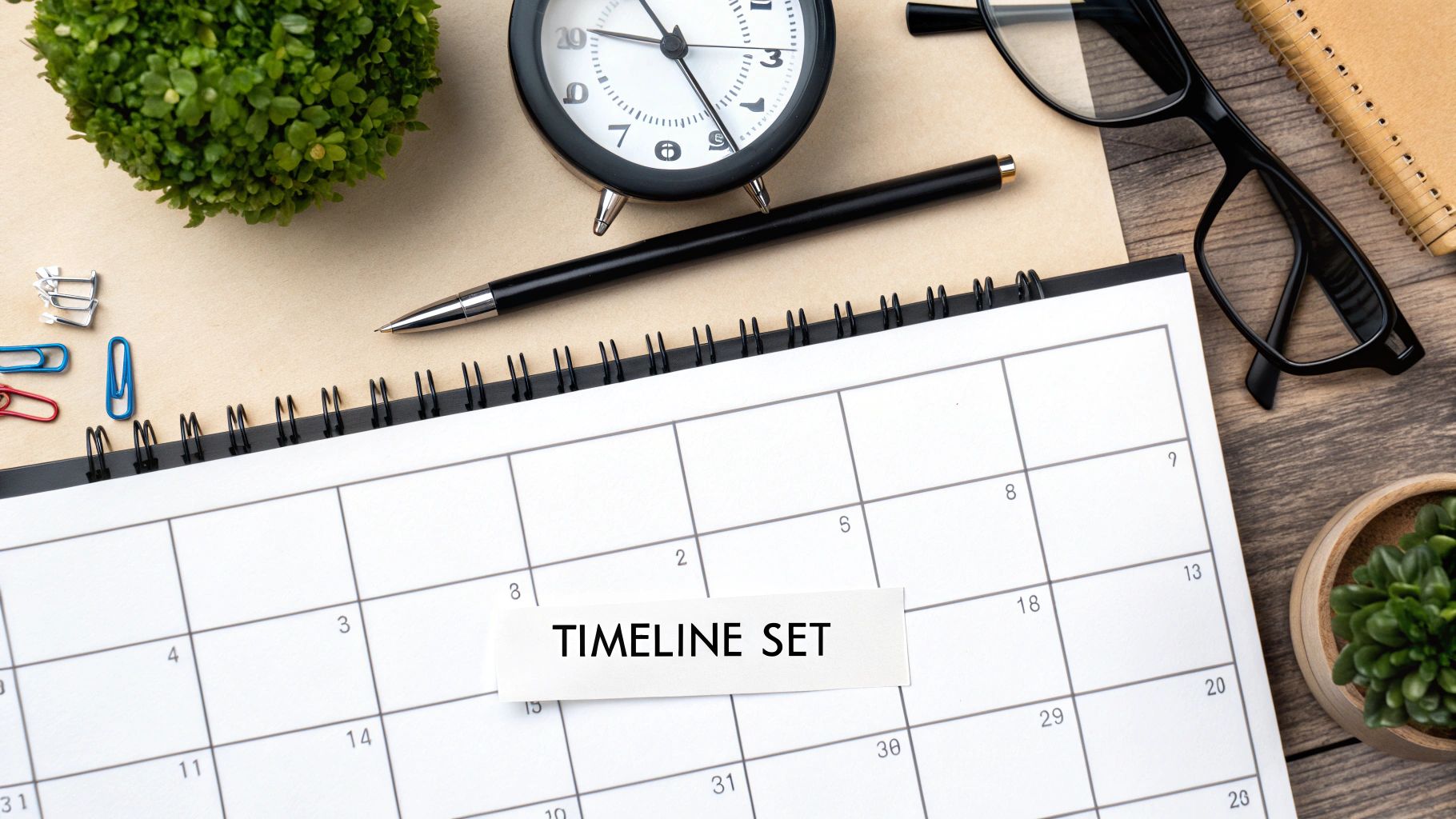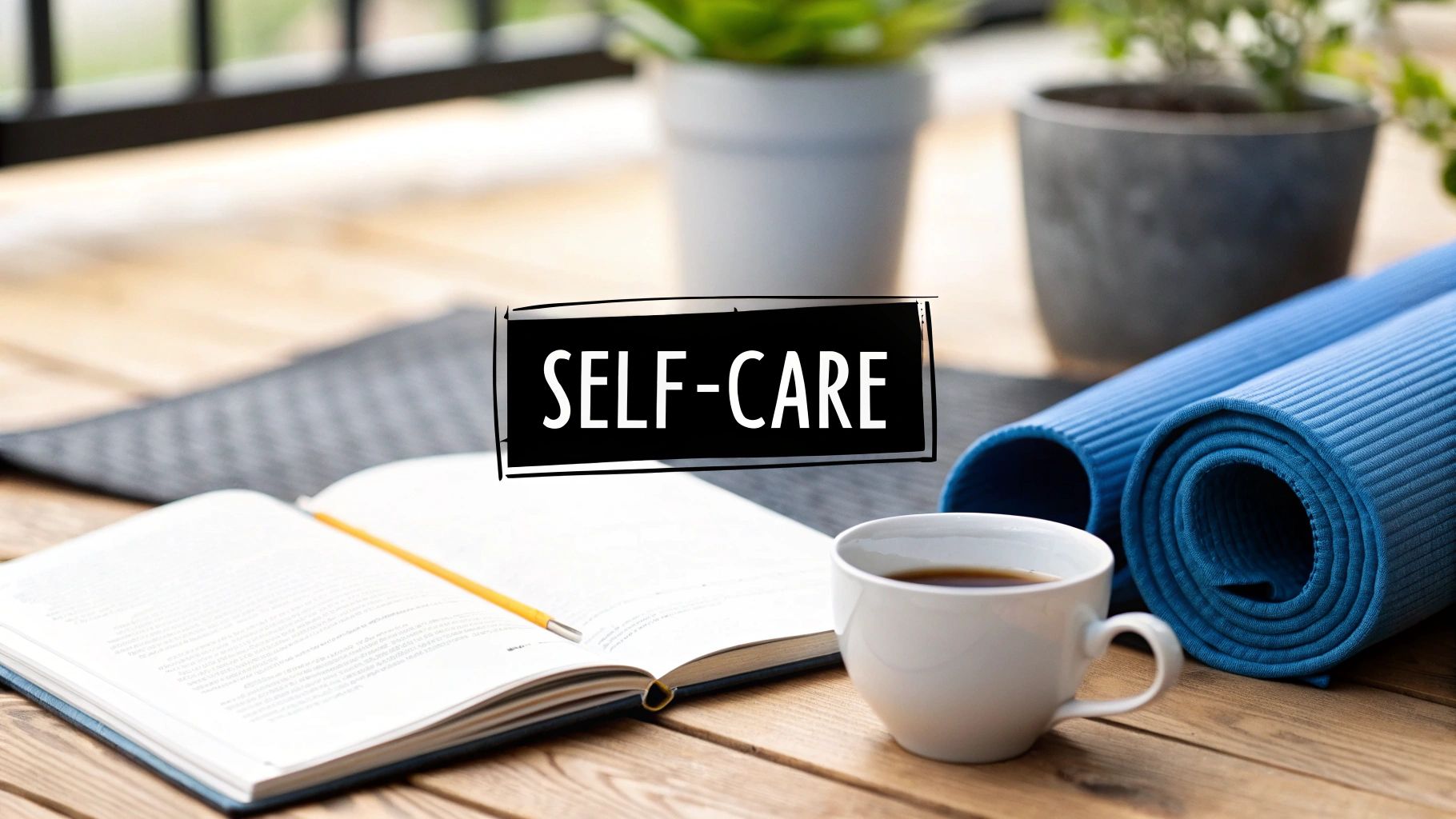Get Ready to Say "I Do" With Confidence
Your wedding day is finally here! Amidst the excitement and anticipation, it's easy to feel overwhelmed. But what if you could navigate this special day with calm assurance, knowing every detail is perfectly in place? From elaborate royal banquets to intimate gatherings, checklists have always been essential for successful event management. Their evolution from simple scrolls to dynamic digital tools highlights their enduring value.
A well-structured checklist transforms complex tasks into manageable steps, minimizing stress and boosting efficiency. This comprehensive wedding day checklist, based on proven strategies and best practices, offers eight essential tasks to ensure your celebration is flawless. Whether you're a couple, a corporate event manager, or a creative planner, these steps will help you savor every moment, confident that everything is running smoothly.
By the end of this article, you'll have the knowledge and tools to confidently orchestrate a seamless and memorable event, from final vendor confirmations to personal self-care.
1. Final Vendor Confirmations

This often-overlooked step is crucial for a smooth wedding day. Final vendor confirmations, ideally 24-48 hours before the event, ensure everyone is on the same page. This includes contacting your venue coordinator, caterer, photographer, videographer, DJ/band, florist, officiant, and any other service providers. Think of it as the final dress rehearsal for your wedding team.
This checklist item acts as a safety net, preventing potential disruptions. It involves verifying arrival times, confirming delivery details, reviewing special requests, and exchanging contact information. Imagine the caterer arriving late or the florist delivering the wrong bouquets – a simple confirmation can prevent these nightmares.
Features of Effective Vendor Confirmations:
- Verify arrival times: Ensure every vendor knows when they are expected.
- Confirm delivery details: Double-check drop-off locations and times for flowers, cake, and rentals.
- Review special requests: Reiterate any personalized instructions.
- Exchange day-of contact information: Share and receive cell phone numbers for easy communication.
Pros of Confirming Vendor Details:
- Prevents miscommunications: Clear communication eliminates confusion and ensures everyone is aligned.
- Reduces stress: Knowing everything is confirmed allows you to relax and enjoy your day.
- Allows time to resolve issues: Catching problems early allows for solutions.
- Creates accountability: Confirmations establish a clear understanding of responsibilities.
Cons of Confirming Vendor Details:
- Can be time-consuming: Contacting multiple vendors takes time and effort.
- Might surface last-minute problems: Confirmations can uncover unexpected issues.
Real-World Examples of Vendor Confirmations:
Successful couples often create a shared document with vendor contacts and confirmation details. Professional wedding planners, like David Tutera, often use checklists and dedicated communication channels. Resources like The Knot and WeddingWire also highlight the importance of vendor confirmations. Check out our article about Service Sitemap for more related resources.
Tips for Implementing Vendor Confirmations:
- Schedule a specific time: Treat confirmations as an important appointment.
- Use email: This creates a written record for reference.
- Share your timeline: This helps vendors understand the day's flow.
- Designate a point person: This frees you to enjoy your wedding.
- Provide an emergency contact: In case you are unavailable.
By prioritizing final vendor confirmations, you can significantly increase the likelihood of a flawless wedding day. This process, while potentially time-consuming, provides peace of mind.
2. Wedding Day Emergency Kit Assembly
A wedding day is a carefully planned event. But even with the best planning, things can still go wrong. A well-stocked emergency kit acts like an insurance policy against minor mishaps that might otherwise derail your celebration. This kit contains solutions for everything from wardrobe malfunctions to unexpected headaches. It’s your secret weapon for staying calm and keeping the festivities on track, making it a crucial part of any wedding day checklist.
A comprehensive wedding day emergency kit is designed to be both compact and portable, yet still cover a wide range of situations. Think of it as a mini-toolkit with categories for easy access: fashion fixes, beauty touch-ups, health essentials, and tech support. The beauty of this kit lies in its customizability. You tailor its contents to your specific wedding needs and potential challenges. For instance, an outdoor wedding might call for insect repellent and sunscreen, while a winter wedding could benefit from hand warmers.
Advantages of Having a Kit
The advantages of having a wedding day emergency kit are numerous. It provides immediate solutions to common problems like a broken zipper or smudged lipstick, minimizing stress and preventing minor issues from becoming major dramas. The peace of mind it offers is invaluable, allowing you to focus on enjoying your special day. It’s also a great way to support your wedding party, offering assistance to anyone who needs it.
Potential Drawbacks
While highly beneficial, there are a few potential drawbacks to consider. Overpacking can make the kit bulky and difficult to manage. There’s also a chance it might not be needed at all. Lastly, you'll need to designate someone—a bridesmaid, groomsman, or wedding coordinator—to manage and transport the kit throughout the day.
Real-World Examples
Real-world examples demonstrate the kit’s value. Imagine a bridesmaid’s heel breaking just before the ceremony. A quick fix with super glue from the emergency kit saves the day. Or perhaps the groom’s boutonniere comes loose. A safety pin offers an instant solution. These seemingly small incidents can disrupt the flow of the day, but a well-stocked emergency kit prevents them from becoming major setbacks.
Wedding planning experts like Martha Stewart Weddings and Mindy Weiss (author of The Wedding Planner & Organizer) have popularized the concept of the wedding day emergency kit. Companies like Pinch Provisions have even capitalized on this need by offering pre-assembled kits, simplifying the process for busy couples. This highlights the widespread recognition of the kit's importance in ensuring a smooth and stress-free wedding.
Practical Tips for Implementation
- Essential Items: Pack safety pins, fashion tape, stain remover, pain relievers, band-aids, a sewing kit, extra buttons, a phone charger, lipstick, tissues, blotting papers, deodorant, and mints.
- Delegate Responsibility: Assign a bridesmaid or wedding coordinator to be responsible for the kit.
- Accessibility: Keep the kit in an easily accessible bag.
- Venue Considerations: Adapt the kit’s contents to the venue. Outdoor weddings might require umbrellas or bug spray.
- Important Documents: Include copies of important documents and contact numbers.
By following these tips, you can create a personalized wedding day emergency kit, ensuring you’re ready for any minor mishap. This preparation lets you relax, enjoy the moment, and truly savor every second of your special day.
3. Final Payment Distribution
Handling final payments to your wedding vendors is a crucial aspect of wedding planning. Often overlooked amidst the excitement, pre-planning your Final Payment Distribution ensures a smooth, stress-free wedding day for both you and your vendors. Addressing this logistical detail in advance lets you fully enjoy the celebration without financial distractions.
This involves organizing payments and gratuities for all your service providers—from the photographer and DJ to the florist and caterer. Properly handling these payments demonstrates respect for your vendors' time and services, fostering goodwill and enabling them to focus on their work without payment concerns.
Streamlining Payment Processes
Effective final payment distribution involves several key components:
- Pre-labeled Envelopes: Clearly labeled envelopes ensure payments reach the intended vendors quickly and efficiently.
- Digital Payments: Leverage online banking or payment apps like Venmo to schedule payments ahead of time.
- Gratuity Calculations: Pre-calculate tips based on industry standards and your satisfaction with each service.
- Payment Tracking: Maintain a system to track paid vendors and amounts, minimizing the risk of double payments or missed payments.
Benefits of Advance Planning
Pre-planning final payments offers several significant advantages:
- Stress-Free Wedding Day: Enjoy your celebration without worrying about payment logistics.
- Timely Vendor Payments: Demonstrates professionalism and respect for your vendors' services.
- Uninterrupted Festivities: Avoid awkward payment conversations during your wedding.
- Positive Vendor Relationships: Fosters goodwill and encourages exceptional service.
Potential Challenges
While pre-planning offers many benefits, consider these potential challenges:
- Cash Management: Handling large sums of cash requires careful planning and security measures.
- Secure Storage: Safeguard cash and checks until distribution in a secure location.
- Cash Withdrawals: Coordinate with your bank for large cash withdrawals in advance.
Practical Tips and Tools
Here are some practical tips and tools to streamline your final payment distribution:
- Wedding Planning Apps: Platforms like Zola offer built-in payment trackers.
- Spreadsheets: Use a spreadsheet to list vendors, contact information, payment amounts, methods, and dates. Include a separate column for gratuities.
- Clear Envelope Labels: Clearly label envelopes with the vendor's name and service (e.g., "DJ – Music").
- Delegate the Task: Assign a trusted family member or wedding coordinator to distribute payments with clear instructions and a detailed list.
- Confirm Payment Timing: Verify each vendor's preferred payment timing (day-of or beforehand).
- Tip Calculation Sheet: Provide a separate sheet with pre-calculated gratuity amounts.
- Cashier's Checks: Consider cashier's checks for larger amounts for added security.
- Digital Receipts: Organize and save all digital payment receipts for your records.
Modern Approaches to Payment Distribution
Final payment distribution has evolved significantly. From simple cash transactions, it now incorporates digital payments, tracking tools, and dedicated wedding planning software. Prominent wedding planners like Colin Cowie emphasize pre-planning payments. Publications like Brides Magazine offer detailed financial guidance. Platforms like The Knot provide tools for tracking vendor payments and managing budgets. These resources have made structured final payment distribution a standard practice for seamless wedding day logistics.
By diligently managing final payments, you ensure a smooth and enjoyable wedding day for everyone. This allows you to focus on celebrating, confident that your vendors are appreciated and compensated appropriately.
4. Personal Item Preparation

Amidst the flurry of wedding planning, preparing your personal items often gets left until the last minute. However, this critical step deserves careful attention and a prioritized spot on your checklist. Overlooking it can create unnecessary stress and possibly detract from precious moments on your special day. From ensuring your wedding attire is ready to packing essentials for the day after, meticulous personal item preparation sets the stage for a smooth and enjoyable wedding. This advice holds true for event professionals managing important events where attention to detail is paramount.
The idea of detailed personal preparation for weddings has gained significant traction, influenced by celebrity stylists like Micaela Erlanger and wedding planning experts like Mindy Weiss. Their meticulous methods, often highlighted in celebrity wedding features and planning guides, underscore the importance of pre-planning and organization. Luxury hotels have also embraced this trend, incorporating personal item assistance into their wedding packages, further emphasizing its role in ensuring a flawless event.
Features and Benefits
Here’s a breakdown of what comprehensive personal item preparation entails:
-
Comprehensive Packing Lists: These lists help ensure you don't forget any crucial items.
-
Overnight Bag Preparation: This prepares you for the wedding night and the following morning.
-
Document Organization: Keep important documents, such as marriage licenses and passports, easily accessible.
-
Sentimental Item Inclusion: Incorporate personal touches that add special meaning to your day.
Advantages of Preparation
-
Stress Reduction: Avoid last-minute panic and enjoy a relaxed wedding morning.
-
Complete Photo Opportunities: Ensure you have everything you need for photographs, capturing every special moment.
-
Extended Celebration: Seamlessly transition to the wedding night and the next morning with all necessary items.
-
Peace of Mind: Knowing you have everything you need eliminates a significant source of stress.
Potential Challenges
-
Organization: Gathering and organizing everything requires careful planning.
-
Safekeeping: There's a risk of misplacing items if not organized methodically.
Practical Tips
-
Categorized Packing: Use separate bags for different parts of the day – pre-ceremony, ceremony, reception, and overnight.
-
Wedding Attire: Pack your complete wedding outfit, including accessories and a backup pair of comfortable shoes.
-
Essential Documents: Remember rings, vows, marriage license, and any travel documents for destination weddings.
-
Comfort Items: Pack a change of clothes, toiletries, makeup, and any necessary medications.
-
Valuables and Technology: Bring chargers, ID, credit cards, cash, and honeymoon documents if applicable.
-
Personal Touches: Don't forget the "something old, new, borrowed, and blue" if you follow that tradition.
Real-World Scenario
Imagine a bride realizing she's forgotten her veil moments before the ceremony. This easily avoidable mishap can be prevented with thorough personal item preparation. Event planners can also apply these practices, ensuring VIP clients have everything they need, from dietary requirements to presentation materials.
By prioritizing personal item preparation, you transform a potentially stressful task into a manageable and even enjoyable one. This meticulous approach ensures a smooth, stress-free wedding day, allowing you to fully savor every moment.
5. Final Timeline Review

Even the most meticulously planned wedding can quickly become chaotic without a well-structured timeline. This is why a final timeline review is a crucial step in the wedding planning process. It's more than just a quick overview; it's a detailed examination of the minute-by-minute schedule of your wedding day. This ensures everyone involved understands their roles and the planned flow of events. From vendor arrival times to specific photo opportunities, this detailed plan minimizes potential issues and maximizes enjoyment for all.
This final review incorporates several key elements. It includes a minute-by-minute breakdown of events, clearly defined roles for each participant, and strategically placed buffer time to accommodate unexpected delays. It also incorporates designated points of coordination to ensure seamless transitions between activities. Think of it as the conductor's score, orchestrating the perfect harmony of your wedding day.
The benefits of this detailed approach are significant. A comprehensive timeline creates clear expectations for everyone involved, prevents scheduling confusion, and ensures a smooth flow throughout the day. This ultimately reduces anxiety about timing, allowing you to relax and savor every precious moment, knowing everything is on track.
While a detailed timeline is invaluable, it’s important to be realistic. Adjustments may be necessary on the day due to unforeseen circumstances. An excessively detailed schedule can sometimes feel overwhelming, so finding the right balance between detail and flexibility is key. Sticking to the timeline also requires cooperation and discipline from everyone involved.
A History of Precision in Event Planning
The importance of precise timing in event planning is not a new concept. Royal weddings, famously orchestrated down to the minute, exemplify this principle. Renowned celebrity wedding planners like Preston Bailey and Mindy Weiss are known for their intricate timelines, further solidifying the practice's effectiveness. Wedding planner Marcy Blum has also long championed detailed timelines, emphasizing their importance for seamless event execution. The advent of wedding timeline apps like LadyMarry showcases how technology has made this crucial process more accessible and manageable for everyone.
Practical Tips for Implementation
-
Buffer Time: Incorporate buffer time between activities. This crucial padding accommodates unforeseen delays and creates a more relaxed atmosphere.
-
Wide Distribution: Share the timeline with the entire wedding party, family members with responsibilities, and all vendors.
-
Vendor Details: Include vendor arrival times, setup requirements, and contact information.
-
Photo Ops: Clearly note specific photo moments you want captured.
-
Contact Information: Include addresses and contact information for all venues and key personnel.
-
Coordinator Review: Review the timeline with your wedding coordinator or a trusted friend, such as your maid of honor, who can help manage the flow of events on the day.
-
Simplified Version: Create a simplified version of the timeline for the wedding party, focusing on their specific roles and timings.
-
Phone Alarms: Set phone alarms for key transition points as helpful reminders.
By investing time in a final timeline review, you're not just planning a wedding; you're creating a seamless and memorable experience for yourself and your guests. This crucial step ensures your special day unfolds smoothly and elegantly, allowing you to cherish every moment.
6. Self-Care Scheduling
Amidst the whirlwind of emotions and activities on your wedding day, self-care isn't a luxury, but a vital necessity. Planning for moments of physical and emotional well-being ensures you're at your best to enjoy this special occasion. Self-care scheduling means incorporating designated quiet time, nutrition planning, hydration, and stress-reduction techniques into your wedding day timeline.
This goes beyond just taking deep breaths. It's about proactively designing your day to include moments that nourish your mind and body. A non-rushed, protein-rich breakfast, scheduled water breaks, and short periods of solitude or time with your partner can significantly impact your overall experience. The benefits include managing emotions, preventing exhaustion, creating memorable moments of presence, and reducing stress. Imagine feeling truly present during your vows, energized for your first dance, and calm enough to savor each moment.
Celebrity brides and even royal weddings have embraced this concept. We often hear of pre-ceremony meditation sessions or meticulously planned nutrition and rest schedules. Celebrity wedding wellness coach Latham Thomas and bridal wellness programs at luxury hotels have further popularized this approach, showcasing the value of prioritizing well-being. More recently, mindful wedding approaches championed by wellness influencers have brought this idea into the mainstream.
However, maintaining this schedule can be challenging. It might require setting boundaries with well-meaning friends and family who might encroach on your quiet time. Communicating your needs clearly and assertively is essential.
Practical Tips for Self-Care Scheduling
Here are some practical tips for implementing self-care scheduling on your wedding day:
- Schedule a non-rushed, protein-rich breakfast: This provides sustained energy.
- Set alarms for water breaks: Dehydration can worsen stress and fatigue.
- Schedule 10-minute breaks to be alone or with your partner: These moments offer a needed respite.
- Plan a full night's sleep the night before: This is often overlooked but crucial.
- Consider a morning workout or yoga: Physical activity can relieve stress.
- Set boundaries with family and friends about quiet time: Politely excuse yourself when needed.
- Bring snacks for between the ceremony and reception: This prevents energy dips.
- Practice mindfulness techniques: Even a few moments of focused breathing can help.
You might be interested in: Our guide on…
Self-care scheduling deserves a place on every wedding checklist because it directly impacts your ability to enjoy the culmination of months of planning. By prioritizing your well-being, you ensure you're not just present, but truly experiencing every magical moment. This isn't selfish; it's an investment in creating an unforgettable and joyful experience.
7. Venue & Decoration Final Check
This crucial step, right before your guests arrive, ensures your wedding vision becomes a reality. The Venue & Decoration Final Check is your last chance to confirm every detail, from the largest centerpiece to the smallest place card, is perfectly placed. It's your insurance against preventable wedding-day mishaps and a key ingredient for a picture-perfect celebration.
This check involves a meticulous walkthrough of your venue. You'll verify that the space layout, decoration placement, lighting, and environmental controls align with your plan. Here's a breakdown:
- Space Layout Verification: Confirm the dance floor, seating arrangements, and other designated areas are correctly positioned and sized.
- Decoration Placement Confirmation: Ensure centerpieces, floral arrangements, signage, and other décor are placed as envisioned.
- Lighting Assessment: Check the ambiance lighting, spotlighting, and any special lighting effects to create the desired mood.
- Environmental Controls Check: Verify a comfortable temperature and optimal environmental factors (like air circulation).
The benefits of this final check are clear:
- Ensures Vision Matches Reality: It bridges the gap between your plans and the actual setup.
- Allows for Last-Minute Adjustments: It provides a window to fix discrepancies before guests notice them.
- Confirms Vendor Setup Is Complete: It confirms vendors have fulfilled their obligations.
- Creates Peace of Mind: Knowing everything is in order allows you to relax and enjoy your day.
However, there are potential downsides:
- May Reveal Issues with Limited Time to Fix: Discovering problems close to the ceremony can add stress.
- Can Be Rushed If Scheduled Too Close to Ceremony Time: Allow ample time for this check to avoid feeling pressured.
- Might Add Pre-Wedding Stress: The process itself can be anxiety-inducing if not managed effectively.
The importance of this step is evident in its adoption by high-end wedding planners like David Tutera, known for meticulous attention to detail and multiple venue checks. Luxury hotel weddings often include staff-conducted final inspections, highlighting the value placed on this practice. The trend has also been popularized by celebrity event planners like Colin Cowie and amplified by Instagram-focused wedding designers seeking perfect photo opportunities. For examples of meticulously planned events, you might be interested in: Our Portfolio Sitemap.
Tips for a Successful Venue & Decoration Final Check
- Delegate: Entrust this task to your wedding planner or a trusted, detail-oriented friend.
- Create a Checklist: A detailed list ensures nothing is overlooked. Include specific items like table settings, centerpieces, place cards, ceremony décor, lighting, temperature, special displays, audio equipment, and accessibility accommodations.
- Verify Stability: Ensure all decorations are securely placed to prevent accidents.
- Test Everything: Don't assume things work; test the audio equipment and lighting.
By dedicating time and attention to this final walkthrough, you can rest assured your wedding venue will perfectly reflect your vision, allowing you to fully embrace the joy and magic of your special day.
8. Ceremony & Reception Items Delivery
Your wedding day is a tapestry of special moments, from exchanging vows to celebrating with loved ones amidst carefully chosen décor. Making sure all the elements that personalize your celebration arrive at the venue and are set up correctly is vital for bringing your vision to life. This is where careful planning for ceremony and reception items delivery becomes essential. This key step ensures those special touches, often the heart of the celebration, seamlessly become part of your big day.
This includes everything from guest books and favors to framed photos, memorial items, and any DIY decorations not handled by vendors. Consider those hand-painted table numbers, the vintage suitcase for cards, or the personalized photo booth props. These details tell your unique story and make your wedding truly yours.
Ensuring Smooth Delivery and Setup
Features of Effective Item Delivery:
- Inventory Tracking System: Keep a detailed list of every item, its designated location at the venue, and the person responsible for it.
- Designated Transportation Plan: Determine how these items will get to the venue (your car, a friend's truck, a hired delivery service) and when.
- Setup Instructions: Clear, written (and possibly visual) guides for setting up each item are crucial, ensuring even helpers unfamiliar with your vision can execute it perfectly.
- Placement Verification: A final check is essential to ensure everything is in its designated spot and looks its best.
Pros of Handling Your Own Items:
- Personalization: Infuse your personality and style into your wedding.
- Creative Expression: DIY elements allow for distinctive, budget-friendly customization.
- Cost Savings: This approach is often less expensive than vendor-provided alternatives.
- Meaningful Memories: These personal touches enrich the sentimental value of your wedding.
Cons to Consider:
- Logistical Coordination: Requires advanced planning and delegation.
- Responsibility: Someone needs to oversee the delivery and setup process.
- Potential Stress: Can add to the already demanding schedule of the wedding day.
Real-World Inspiration and Growing Trends
Real-World Examples:
- Wedding coordinators often utilize detailed floor plans and placement maps, similar to a theatrical stage production, ensuring every personal item is strategically positioned.
- Celebrity weddings often showcase elaborate personal touches, sometimes requiring specialized delivery and handling, highlighting the importance of meticulous planning. Imagine custom ice sculptures or personalized projections requiring specialized equipment.
Evolution and Popularization:
The focus on personalized weddings has increased significantly, influenced by DIY wedding experts like Darcy Miller and lifestyle icons like Martha Stewart Weddings. Budget-conscious planning has also played a role, as couples explore creative ways to personalize their celebrations without overspending.
Practical Tips for Seamless Execution
Practical Tips for Implementation:
- Create a Master Inventory List: Include photos and detailed descriptions of each item.
- Pack Smart: Use clearly labeled boxes or containers for easy identification.
- Written Setup Instructions: Provide clear, step-by-step instructions for arranging each item.
- Delegate Responsibly: Assign specific individuals to deliver and set up each category of items.
- Visual Aids: Take photos of the desired placement for easy reference.
- Early Delivery: Deliver items the day before the wedding if possible.
- Emergency Kit: Pack extra supplies (tape, scissors, fishing line, etc.) for any last-minute adjustments.
- Retrieval Plan: Determine which items you want to take home and arrange for their collection after the event.
By following these guidelines, you can ensure your personal touches are flawlessly incorporated into your wedding day, creating a celebration that is both beautiful and deeply meaningful. This seemingly small detail can significantly enhance the overall ambiance and truly reflect the unique love story you're celebrating.
8-Point Wedding Day Checklist Comparison
| Task | Implementation Complexity (🔄) | Resource Requirements (⚡) | Expected Outcomes (📊) | Ideal Use Cases (⭐) | Key Advantages (💡) |
|---|---|---|---|---|---|
| Final Vendor Confirmations | Moderate – multiple contacts needed | Requires vendor contact lists and scheduling tools | Clear coordination; reduced day‐of stress | Weddings with many service providers | Prevents miscommunication and creates accountability |
| Wedding Day Emergency Kit Assembly | Low to Moderate – kit preparation | Assembled emergency supplies and a portable storage solution | Immediate solutions for minor mishaps | Weddings where small emergencies are possible | Reduces stress and provides peace of mind |
| Final Payment Distribution | Moderate – careful cash and label handling | Payment envelopes or digital tracking systems | Smooth payments and avoidance of awkward money exchanges | Weddings with multiple vendors requiring day‐of payments | Eliminates financial stress and fosters vendor goodwill |
| Personal Item Preparation | Moderate – comprehensive checklist needed | Detailed packing lists and organized storage | Ensures no essential item is forgotten | Weddings with complex attire and numerous personal items | Reduces morning-of chaos and oversight |
| Final Timeline Review | High – detailed schedule coordination | Complete timeline documents and shared schedules | Streamlined event flow with clear roles | Elaborate weddings with strict, minute-by-minute schedules | Prevents scheduling confusion and reduces overall anxiety |
| Self-Care Scheduling | Low – scheduling designated time slots | Allocated time blocks and reminders for wellness | Enhanced physical and emotional well-being | Busy weddings where stress management is crucial | Maintains energy levels and promotes mindfulness |
| Venue & Decoration Final Check | Moderate – thorough walkthrough required | A detailed checklist and coordinated site inspections | Venue and décor set-up matching the vision | Venues with intricate designs or last-minute adjustments | Offers reassurance and opportunity for quick fixes |
| Ceremony & Reception Items Delivery | Moderate – requires logistics management | Inventory tracking tools and designated transportation plans | All personal, DIY, and decorative items properly placed | Weddings emphasizing personalized touches and DIY elements | Enhances personalization while ensuring creative elements are delivered |
Enjoy Your Dream Wedding!
From confirming final vendor details to packing your emergency kit, and from prepping personal items to checking the venue, your wedding day checklist has a lot to cover. A well-structured checklist helps create a smooth, stress-free celebration. By diligently following these guidelines, you can anticipate and address potential hiccups, allowing you to fully embrace the joy of your special day.
Remember to schedule some self-care amidst the excitement. Ensuring you're relaxed and present for every moment is crucial. Reviewing the final timeline with your team and confirming the delivery of all essential items to the venue are vital for seamless execution.
Unexpected situations can arise, so learning to adapt is key. Flexibility will be your best friend on your wedding day!
Embracing Current Trends
The world of event planning is always changing. Trends like personalized experiences, sustainable practices, and tech integration continue to shape how we celebrate. These advancements can truly enhance and personalize your event.
- Interactive Entertainment: Consider options that get your guests involved and create a lively atmosphere.
- Custom-Designed Decor: Make your event unique with decor that reflects your personal style.
- Virtual Guest Experiences and Live Streaming: Allow loved ones from afar to participate in your special day.
Key Takeaways for a Perfect Day
- Preparation is Paramount: A detailed checklist ensures every detail is taken care of.
- Self-Care is Essential: Prioritize your well-being amid the flurry of activities.
- Flexibility is Key: Be ready to adapt to unforeseen circumstances and embrace the unexpected.
- Stay Current: Keep up with emerging trends to elevate and personalize your event.
Planning any event, whether a wedding, corporate gathering, private party, or charity function, requires meticulous attention to detail and flawless execution. Looking to create a truly unforgettable experience? 1021 Events specializes in crafting exceptional moments. We offer a comprehensive suite of services, from professional DJ/MC services and uplighting to stunning videography and photography, complete with drone coverage.
We bring your vision to life with innovative visual effects like atmospheric haze, cold sparks, custom photo backdrops, and monogram Gobo projections. Our goal is to ensure a personalized and seamless celebration. Transform your special occasion into an extraordinary experience with 1021 Events. Visit us at 1021 Events to learn more and let us help you create a celebration that reflects your unique style and values.
Article created using Outrank



